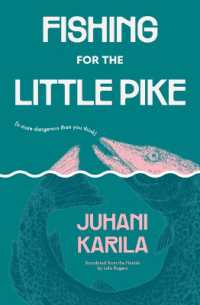- ホーム
- > 洋書
- > 英文書
- > Science / Mathematics
Full Description
Plants provide insects with a range of specific foods, such as nectar, pollen and food bodies. In exchange, they may obtain various services from arthropods. The role of food rewards in the plant-pollinator mutualism has been broadly covered. This book, first published in 2005, addresses another category of food-mediated interactions, focusing on how plants employ foods to recruit arthropod 'bodyguards' as a protection against herbivores. Many arthropods with primarily carnivorous lifestyles require plant-provided food as an indispensable part of their diet. Only recently have we started to appreciate the implications of non-prey food for plant-herbivore-carnivore interactions. Insight into this aspect of multitrophic interactions is not only crucial to our understanding of the evolution and functioning of plant-insect interactions in natural ecosystems, it also has direct implications for the use of food plants and food supplements in biological control programs. This edited volume provides essential reading for all researchers interested in plant-insect interactions.
Contents
1. Food for protection: an introduction F. L. Wäckers and P. C. J. van Rijn; Part I. Food Provision by Plants: 2. Suitability of (extra-) floral nectar, pollen and honeydew as insect food sources F. L. Wäckers; 3. Nectar as fuel for plant protectors S. Koptur; 4. Fitness consequences of food-for-protection strategies in plants M. W. Sabelis, P. C. J. van Rijn and A. Janssen; Part II. Arthropods Feeding on Plant-Provided Food: 5. Food needs of adult parasitoids: behavioural adaptations and consequences D. M. Olson, K. Takasu and W. J. Lewis; 6. Effects of plant feeding on the performance of omnivorous 'predators' M. D. Eubanks and J. D. Styrsky; 7. Nectar and pollen feeding by adult herbivorous insects J. Romeis, E. Städler and F. L. Wäckers; Part III. Plant-Provided Food and Biological Control: 8. Impacts of plant-provided food on herbivore-carnivore dynamics P. C. J. van Rijn and M. W. Sabelis; 9. Does floral nectar improve biological control by parasitoids? G. E. Heimpel and M. A. Jervis; 10. Habitat diversification in biological control: the role of plant resources T. K. Wilkinson and D. A. Landis; 11. Providing foods for natural enemies in farming systems: balancing practicalities and theory G. M. Gurr, S. D. Wratten, J. Tylianakis, J. Kean and M. Keller.








